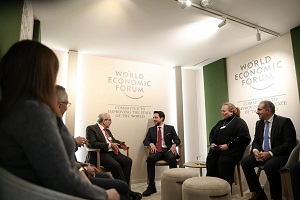Syrian Turns His Home into a Silk Museum to Celebrate the Ancient Craft

Asharq Al-Awsat
After Syria's war whisked away the silkworms from his mulberry trees, 65-year-old Mohammed Saud instead turned his idle home workshop into a silk museum to celebrate the ancient craft.
In the green hills of Deir Mama, Saud, his wife and three sons have been making silk for decades.
They would raise silkworms in the spring, watching them munch on mulberry tree leaves and slowly build their thick cocoons, before spinning the thread and weaving it into fine cloth.
But Syria's nine-year-old war has complicated silkworm imports, and stemmed production for now, AFP reported.
In his courtyard-turned-museum, Saud held up a handful of glistening white silk cocoons the size of large grapes.
Stooping down, he manually yanked around a large wooden spinning wheel used to unfurl the tight coils into long pale thread.
"There are just three families left in Syria working this craft," he said. "Today I am the only one left in this town fighting for its survival."
Sitting at a large wooden loom with his feet on the pedals, he demonstrated weaving, his agile hands gliding from side to side as he weaved weft over warp.
In a corner, off-white silk shawls were displayed on the wall, or draped around mannequins.
A decade ago, the year before the conflict broke out, he had told AFP that 16 villages and 48 families across Syria still worked in sericulture.
Cocoon harvests had already dropped from 60,000 tonnes in 1908 to just 3.1 tonnes in 2010. When fighting erupted in 2011, it all ground to a halt.
"I decided to transform my home into a workshop when I realized it would contain all stages of silk production," Saud explained.
Deir Mama was famous for silk production before the war, with most residents specializing in one stage or another of the process.
Not far from the large Masyaf citadel, the town's mulberry trees stretched across wide swathes of land, drawing in silk fans from Syria and beyond.
On the museum's wall hung some old photos of Saud posing with foreign visitors, and a few of their thank you notes.
"I used to rely mainly on tourists, as they were the ones able to afford the silk," he said.
But these days, even if the museum tour is free, visitors are rare.
Before the conflict the craft was like "a sick man we hoped would heal, but then the war came along and dealt it a final blow".
"I alone am battling for the trade's survival... even if it is clinically dead."
According to AFP, after nine years of war that has killed 380,000 people and devastated the economy, tourism is non-existent.
And for Syrians struggling to put food on the table amid alarming price hikes, fine cloth is the last of their worries.
"Silk has become a luxury in this crisis," Saud said.




